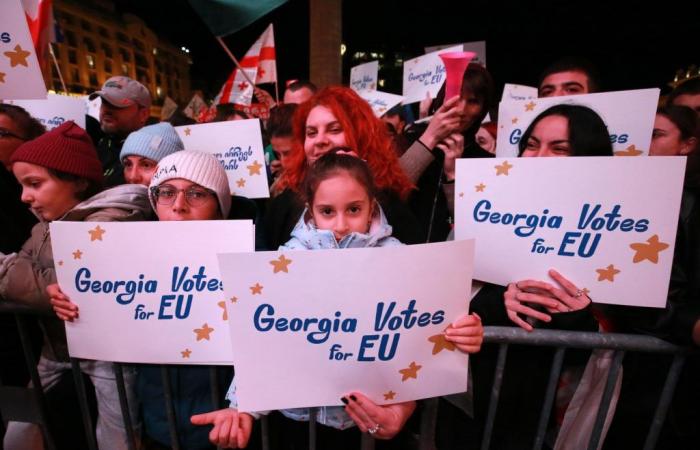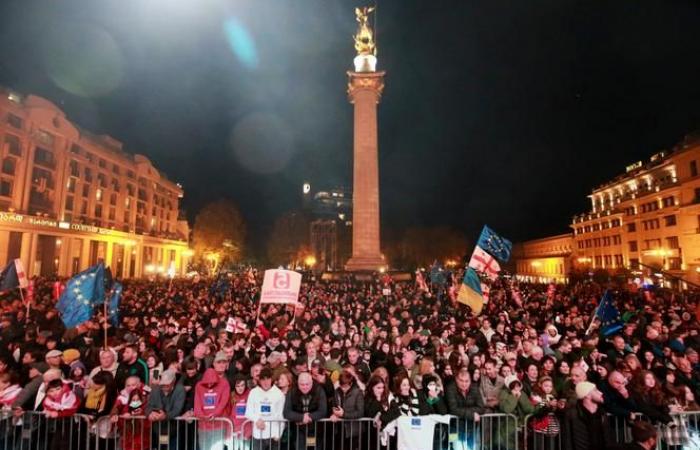Tens of thousands of pro-European demonstrators gathered on Sunday October 20 in Tbilisi, Georgia, a week before legislative elections which are crucial for the democratic future of the country and have the value of “referendum” between Europe and Russia.
The pro-European opposition of this small Caucasian country, made up of four main alliances, faces the ruling conservative party, Georgian Dream, next Saturday, accused by its detractors of pro-Russian authoritarian drift and of derailing Tbilisi’s plan to join to the European Union.
In the streets of central Tbilisi, the capital, many demonstrators came with Georgian and European Union (EU) flags, according to an Agence France-Presse (AFP) journalist present on site. Others hold up, in the night, signs reading: “Georgia chooses the EU”. The crowd converged on Liberty Square at the call of several NGOs who want “show their determination to continue the path to membership” to the EU.
Read also | Article reserved for our subscribers “Georgia elections pose new geopolitical test after Russia’s invasion of Ukraine”
Add to your selections
“Europe or the return to an uncertain Russian past”
Recent polls in recent days seem to indicate that the opposition alliance could win enough votes on October 26 to defeat Georgian Dream, the party of billionaire Bidzina Ivanishvili. At 68 years old, he has secretly held the reins of power for around ten years, without holding any government office. The results will be closely scrutinized in Brussels, at a time when European leaders fear that Georgia is moving away from its ambition to join the EU. The objective of European membership is however enshrined in the Constitution of this former Soviet republic.
Read also | Article reserved for our subscribers Repression of the opposition, anti-LGBT bill: in Georgia, the Georgian Dream program sows concern before the elections
Add to your selections
The pro-European president, Salomé Zourabichvili, at odds with the government but who has very limited powers, set the scene at the beginning of October in an interview with AFP: “We have a quasi-referendum on the choice between Europe or a return to an uncertain Russian past. »
Opposite, the oligarch and former prime minister, Bidzina Ivanishvili, regularly criticizes the West and called on his supporters to vote for his Georgian Dream party, for “choose between slavery and freedom, submission to foreign powers and sovereignty, war and peace”. The government has said it will ban pro-Western opposition parties if Georgian Dream gains a sufficient majority to pass the measure.
Youth protest
The vote on Saturday, October 26, one of the most important in the country since the fall of the USSR according to observers, comes after several waves of anti-government protests led in particular by young people.
In May, demonstrators massively took to the streets against a law on “foreign influence”criticized in the West because it was inspired by Russian legislation on “foreign agents” used to suppress dissenting voices.
The World Application
The Morning of the World
Every morning, find our selection of 20 articles not to be missed
Download the app
Brussels subsequently froze Georgia’s accession process to the EU, and the United States imposed sanctions on Georgian officials accused of having authorized a “brutal repression” demonstrators. Tbilisi responded by threatening to ” goodbye “ its diplomatic relations with Washington. The head of European diplomacy, Josep Borrell, recently expressed concern about “slip” from Georgia “towards authoritarianism”describing the vote as « test crucial ».
Read also | Article reserved for our subscribers Freezing of Georgia’s accession process to the European Union
Add to your selections
Russia, a historic player in the Caucasus, shares nearly 1,000 kilometers of border with Georgia. Mr. Ivanishvili made his fortune there after the fall of the USSR, before returning to Georgia in the early 2000s. A sign of the stakes, the Kremlin accused the West of interference on Tuesday, October 15. “unconcealed” in the next elections.
Several observers have already warned of the risk of unrest if Georgian Dream tries to cling to power whatever the result of the election, with others citing potential future fraud.
Read also | Article reserved for our subscribers In Georgia, exile as the only horizon for many opponents
Add to your selections







